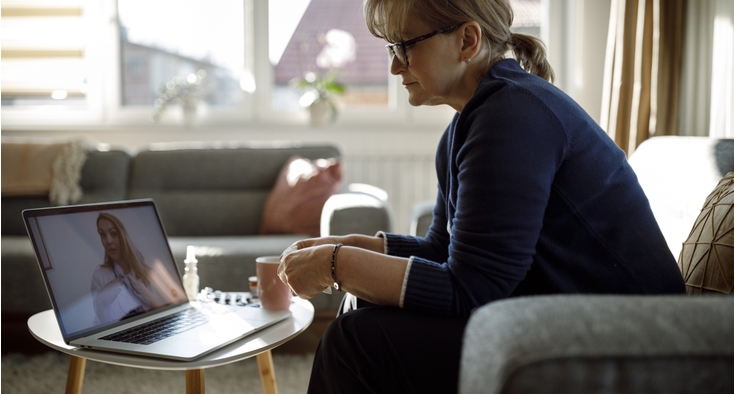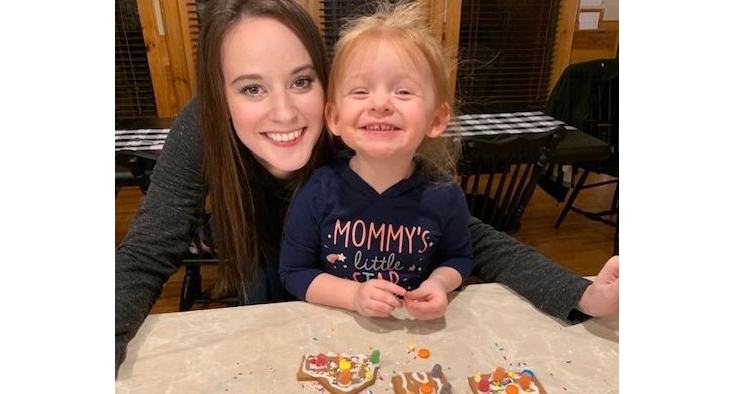Some callers are isolated. Others, overwhelmed. One threw a fit in the grocery store. Another was secretly drinking through the day while working from home. The one thing they had in common: reaching out to Novant Health’s free behavioral health helpline.
Still today, the calls involve COVID-19 related concerns. So, we asked some helpline therapists for a few stories (and their best advice), to show none of us are alone, and that, anytime you need it, help is here.
‘Trapped in her environment'

One caller, who worked at home before the virus began, had a high-stress job that frequently left her feeling overwhelmed, said Mindy France, a therapist at Novant Health Forsyth Behavioral Health Outpatient. “At the onset of the pandemic, suddenly her children were home all day needing care. And because her husband was working from home, she now had no time to herself.”
The caller felt burdened by the additional demands on her time and attention, with no outlets to help deal with her feelings. “Trapped in her environment, the caller felt isolated and helpless,” France explained. “She needed help learning some ways to cope and to manage the stress from this new way of life.”
‘Betrayed by the world’
Too much time alone, however, brings its own challenges. Alice Barclay, therapist at Novant Health Forsyth Behavioral Health Outpatient recalls a call from a woman who felt isolated and fearful. Unable to spend time with others, particularly her grandchildren, she felt desperate, agitated and “betrayed by the world.”

“She said she was normally a logical person,” Barclay said, “but when she called, she had almost reached the point of paranoia.” In one instance, when a store was out of toilet paper, the woman reacted with such agitation and anger that the manager threatened to call the police. Hardly recognizing herself in this situation, she knew it was time to ask for help.
‘The urges were returning’
People with a history of substance abuse are perhaps even more at risk from COVID-related stressors. Barclay spoke to a former behavioral health client who had been a heavy IV-heroin user, and had just spent 17 months in prison. “He is desperate to get into treatment,” she said. “He hasn’t used in the four weeks since he was released, but the urges were returning and he felt terrified.”
Having cut ties with old friends involved in drugs, the caller felt isolated, and had trouble finding an online 12-step meeting or other positive support. “Boredom is a trigger for him. The structure of his days in prison had probably been keeping him sober,” Barclay said. “He wanted to stay busy, but with the way things are, he just didn’t know how.”
It's OK to ask for help. It's also free
North Carolina residents who are in emotional distress — or would like guidance on helping someone they know who is struggling with depression, anxiety, alcohol or drug use — can call a free 24-hour helpline at 1-800-718-3550 to speak with a counselor. The service, provided by Novant Health, connects callers with a master's level therapist who can offer immediate guidance and help determine possible next steps, which could include a further assessment or connection to community resources for those in need.
Drinking at noon
For similar reasons, others are turning to alcohol during the day, even when working. One caller told Barclay he starts drinking at noon. “He used to drink socially,” she said, “but now he’s having up to 12 a day. Working from home, he doesn’t have to talk to anyone, so nobody knows.”
How to stay well
“People are feeling very anxious and overwhelmed by the lingering pandemic,” France said. “Some callers have told us they feel like they are ‘about to have a nervous breakdown.’ Others have even started having thoughts of harming themselves.”
With their extensive training and day-to-day, front-line experience, the mental health professionals at Novant Health's behavioral health helpline are in the perfect position to offer advice. Here, they offer 6 tips for staying well — and even thriving — during a trying time:
- Climb your stairs, go for a walk, or do some stretches during commercials when watching TV. “Working as much movement as possible into your day,” France says, “can keep your body healthy and boost your mood.”
- Head outside to soak up some sun and connect with nature. Staying indoors all the time can lead to feelings of anger and agitation, according to Barclay. “If my toddler sat inside all day watching videos, it’s natural he would be irritated,” she said. “But when he goes out in the fresh air and sunshine, and gets to throw rocks in the pond, it lifts his spirits.”
- Chat with friends and family by phone or video as often as you can. Being around other people feels good, and helping alleviate others’ loneliness is a happiness-inducing act of kindness.
- Meditate. Some great apps are available to help you get started. “Or, better yet, find a place where you can sit outside and just breathe,” France said. Having some time alone allows you to process feelings and decompress from increased stress and pressure.
- Tackle some projects you’ve been wanting to get to, like DIY home repairs, decluttering your closets or finishing the sweater you started knitting last winter. Completing tasks and achieving goals gives you a satisfying sense of purpose, and can alleviate feelings of helplessness.
- Reach out for help — don’t wait until you’re in crisis. Whether you are concerned about substance abuse issues (your own or a loved one’s) or just need to talk through your feelings, therapists at Novant Health’s Behavioral Health helpline are on hand 24/7 to answer calls.
Seek support early

“The fear, stress and anxiety is real, and deserving of our attention,” said Susan Doub, manager of operations for Behavioral Health Outpatient Services at Novant Health Forsyth Medical Center. “People get into deeper trouble when they ignore their symptoms.”
Instead, she urges people not to wait until their distress is unbearable, but to seek support early on. Callers will be connected with fully-trained professional therapists who can lend a listening ear, offer support and help identify the best steps to take next.
“The therapists answering our phones are so compassionate, so genuine. They truly appreciate the opportunity to talk with anyone who calls, especially during this difficult time,” Doub said. “That’s what they do. It’s not just their job, it’s who they are.”











